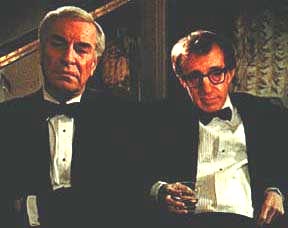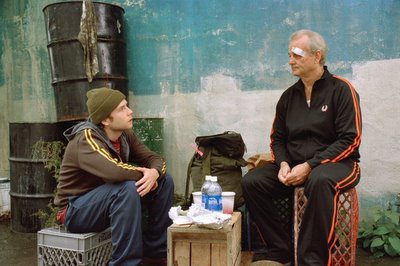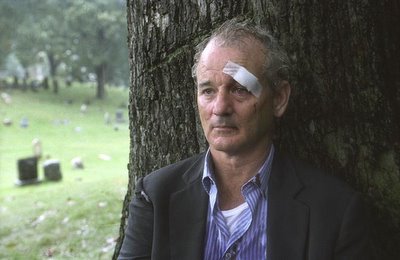
Well, given what I've read it seems Woody Allen's new movie, Match Point, is going to serve up a dish colder than 1984's Crimes and Misdemeanors. I guess every once in a while Allen slices open my fears and makes me stare at their rust-and-cream guts, their "exuberant godlessness," as Film Comment described the movie, both horrifying and horrifyingly familiar. I count on him for the occasional whiff of corruption, so to speak. Even Broadway Danny Rose (1984) and Stardust Memories (1980) have a bit of the charnel house about them; despite their farcical/phantasmagoric trappings, "the bullets go right through," as Danny says, realizing that being shot in the eyes is fatal. I'm willing to peer into this, as long as I'm free to extrapolate it all back into my own moral universe.
 That kind of freedom in a movie is a real pleasure. For me, one of the masters of the inviting shrug is Jim Jarmusch, and he shrugs like mad--if such a thing is possible--in what may be his breeziest work--although I haven't seen Coffee and Cigarettes; but I wonder if those improv-vignettes count--Broken Flowers. I hesitate, though, to call this "breezy." After all, there's all kinds of sad revelations and scary monsters--and prurient creep that I am, I cannot shake the giddy terror--the both puerile AND febrile heartstopper--that is his encounter with the audaciously named--and just plain audacious--Lolita (Alexis Dziena), daughter of ex-girlfriend Laura (Sharon Stone). The only thing more honest than Lolita's casual, dangerous nudity is Murray's face as he registers an expression I can completely undetstand--in fact, I'll bet I was wearing the exact same one as I gaped at those dangerous curves--followed by a patented Bill Murray hasty retreat, stiff-legged and panicked but somehow graceful. Jarmusch and his star are having a great time, and the movie--despite the sad limbo Murray's character wanders through as he searches for the potential mother of his potential son--marches with ambiguous but humane steps toward Don's necessary, lasting reminder--not revelation; you can see in the movie's first moments Don's determined immobility--that he has missed having a life.
That kind of freedom in a movie is a real pleasure. For me, one of the masters of the inviting shrug is Jim Jarmusch, and he shrugs like mad--if such a thing is possible--in what may be his breeziest work--although I haven't seen Coffee and Cigarettes; but I wonder if those improv-vignettes count--Broken Flowers. I hesitate, though, to call this "breezy." After all, there's all kinds of sad revelations and scary monsters--and prurient creep that I am, I cannot shake the giddy terror--the both puerile AND febrile heartstopper--that is his encounter with the audaciously named--and just plain audacious--Lolita (Alexis Dziena), daughter of ex-girlfriend Laura (Sharon Stone). The only thing more honest than Lolita's casual, dangerous nudity is Murray's face as he registers an expression I can completely undetstand--in fact, I'll bet I was wearing the exact same one as I gaped at those dangerous curves--followed by a patented Bill Murray hasty retreat, stiff-legged and panicked but somehow graceful. Jarmusch and his star are having a great time, and the movie--despite the sad limbo Murray's character wanders through as he searches for the potential mother of his potential son--marches with ambiguous but humane steps toward Don's necessary, lasting reminder--not revelation; you can see in the movie's first moments Don's determined immobility--that he has missed having a life. As Don at the end peers closely at every young man he encounters, seeing his son in their faces, I'm not sure if that's a bad thing. Jarmusch, like Allen, creates a world that hangs suspended--but in Broken Flowers--and Allen's Broadway Danny Rose and Stardust Memories (unlike Crimes and Misdemeanors and, it appears, Match Point)--the hanging isn't fatal, with a sick snap and a mess no one cleans up because no one notices; instead, we get a kind of floating anticipation eddying around half-admitted regrets. For Jarmusch and Allen, that's practically slapstick.
As Don at the end peers closely at every young man he encounters, seeing his son in their faces, I'm not sure if that's a bad thing. Jarmusch, like Allen, creates a world that hangs suspended--but in Broken Flowers--and Allen's Broadway Danny Rose and Stardust Memories (unlike Crimes and Misdemeanors and, it appears, Match Point)--the hanging isn't fatal, with a sick snap and a mess no one cleans up because no one notices; instead, we get a kind of floating anticipation eddying around half-admitted regrets. For Jarmusch and Allen, that's practically slapstick.
No comments:
Post a Comment